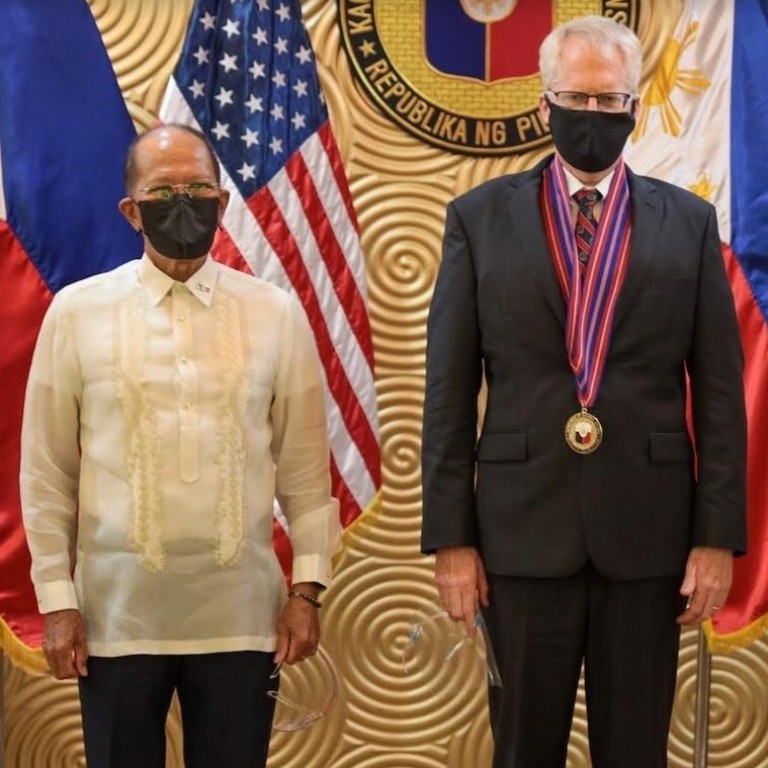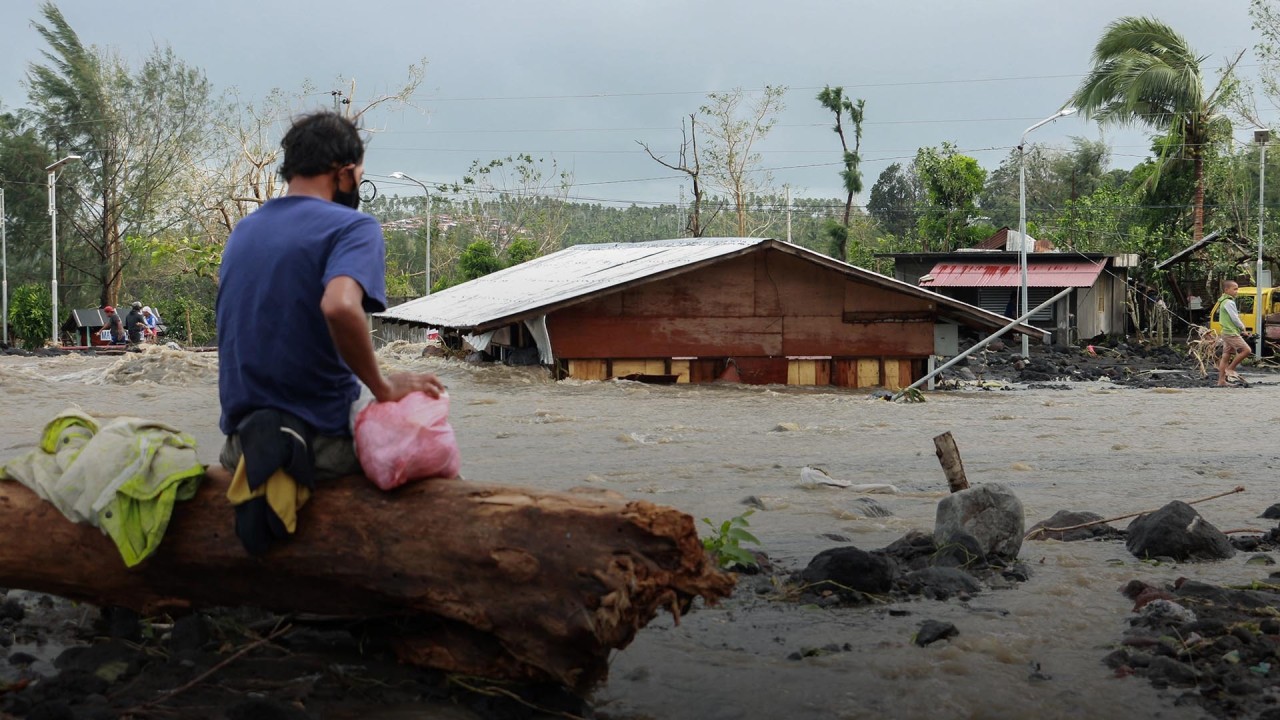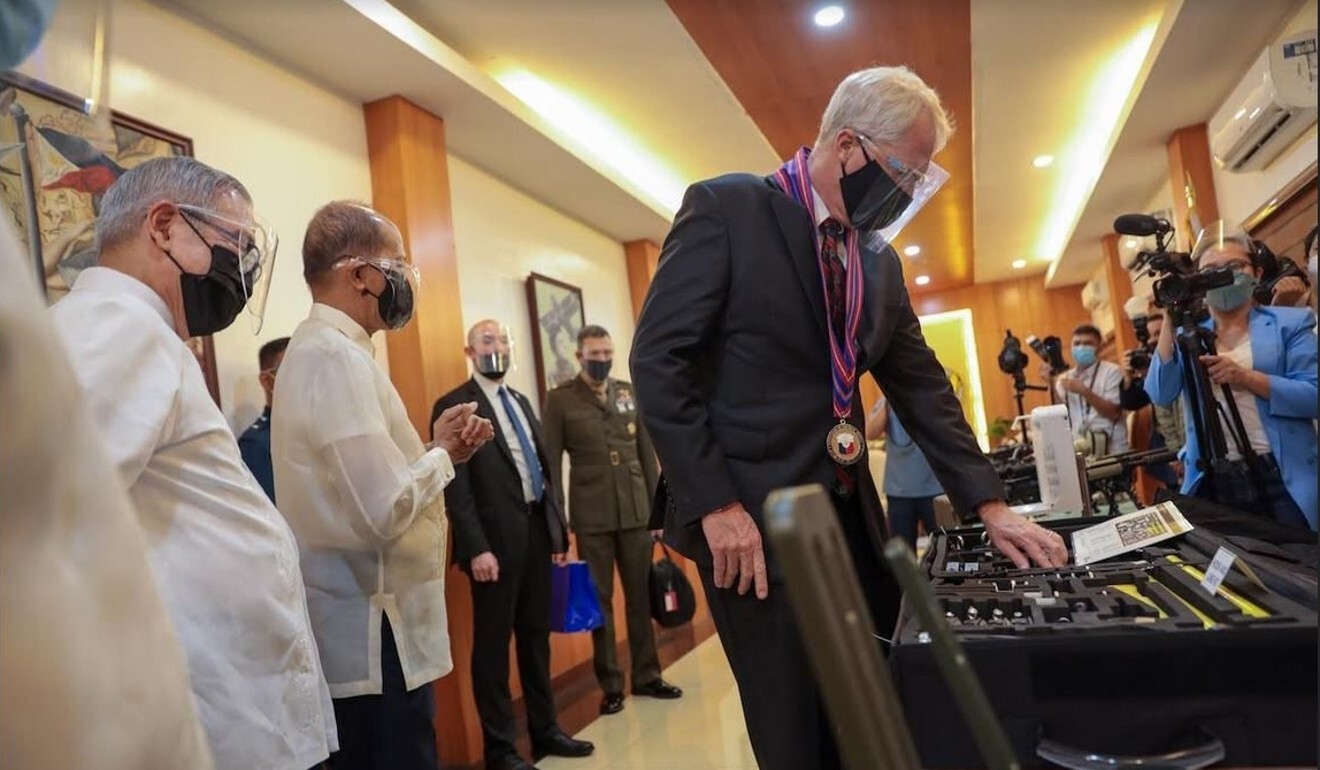
Donald Trump’s parting gift to Philippines: defence equipment worth US$29 million
- The offering from US Acting Defence Secretary Christopher Miller was the latest gift to Manila from Washington as it aims to counter China in the region
- An article written by Miller for a local newspaper rejecting China’s claims in the South China Sea drew a harsh rebuke from Beijing’s envoy to Manila
Philippine Defence Secretary Delfin Lorenzana, who received the donation from US Acting Defence Secretary Christopher Miller, called the unexpected gift “a symbol of the Philippines and the United States’ continued warm alliance”.
The other gifts have included US$18 million worth of precision-guided weapons; a ScanEagle Unmanned Aerial System, which went to the Philippine Navy; and US$23.4 million worth of aid for the victims of a recent typhoon that lashed the country.

02:01
Typhoon Goni, Philippines’ strongest storm of 2020, kills at least 10 people
Lorenzana noted that “the Philippines is the largest recipient of US military assistance in the Indo-Pacific region”, although he did not say what he and Miller had talked about during their meeting earlier in the day.
A statement from his office merely said that both officials “have agreed to boost further the military-to-military engagement between the two countries” – an oblique reference to the Visiting Forces Agreement (VFA) between the two countries, which Philippine President Rodrigo Duterte had scrapped earlier this year before reimplementing.
According to the US Embassy, Miller “underscored the importance of the US-Philippine alliance to national and regional security, and discussed opportunities for greater bilateral security cooperation to maintain a free and open Indo-Pacific region”.
Ahead of Miller’s day-long visit, a war of words erupted between the Chinese envoy to Manila, Huang Xilian, and Miller over an opinion article written by Miller that was published on Monday in The Philippine Star.
In the article, Miller reiterated President Donald Trump’s national security strategy, which he said included “forcefully denouncing the coercive and destabilising activities of the People’s Republic of China (PRC) in the region, particularly in the South China Sea”.

Miller said the US considered the 2016 ruling by an Arbitral Tribunal formed under the United Nations Convention of the Law of the Sea (UNCLOS) – which invalidated China’s claims in the South China Sea – the “final and legally binding decision on the PRC and the Philippines”.
“Consistent with that ruling, the United States explicitly rejects all PRC maritime [claims] in the Philippines’ exclusive economic zone,” Miller said in the article.
“We also reject all PRC maritime claims that derive from islands in the Spratlys that overlap with the exclusive economic zones of Vietnam, Malaysia, Brunei, and Indonesia due to the PRC’s failure to present a coherent maritime claim that is consistent with treaties Beijing has signed.”
He added: “We agree with our close friends in Asean that rules make right in the South China Sea, and we applaud them for standing up for what is right.”
China pledges U$20 million donation to Philippines as defence chiefs meet
Huang called Miller’s piece “full of groundless accusations against China and colossal fallacies about the South China Sea” and the regional situation, and added that the “US is the biggest driver of the militarisation of the South China Sea and the most dangerous external factor endangering the peace and stability” of the region.
“The purpose of [Miller’s] visit is not to promote regional peace and stability, but to create chaos and confrontation in the region to the last minute of the incumbent administration,” Huang said.
Huang also swatted down Miller’s reference to UNCLOS, saying that “ironically the US itself has refused to join and respect the UNCLOS per se”.

06:24
Explained: the history of China’s territorial disputes
“The current US administration has pulled out of more international treaties than anyone before it, making itself the most damaging force of the current international order,” he said.
Huang also criticised the Washington-based think tank Asian Maritime Transparency Initiative (AMTI), which published a report last week saying that the Chinese Coast Guard had increased its patrols in the South China Sea amid the pandemic.
Huang slammed the piece as “distorted and biased”, saying that “even high-ranking military officials of the Philippines have denied Chinese vessels are conducting hostile activities”.
AMTI director Greg Poling told This Week in Asia that “we merely report the signals those vessels send out because they want to be seen patrolling Philippine waters. If the ambassador doesn’t approve of the report, he should take it up with the China Coast Guard”.
Biden’s US faces uphill battle winning back Asia’s hearts and minds
Poling added that “no Philippine official has contradicted the report”.
As for Miller’s visit, Poling said it seemed aimed at cementing the US “messaging around the ‘Free and Open Indo-Pacific’ as the administration heads for the exits. But it is hard to sell that on the heels of the president, vice-president, and secretary of state all skipping the US-Asean and East Asia Summits again last month”.
Derek Grossman, a senior defence analyst at Rand Corporation, said he was unsure of the purpose behind the visit.
“I don‘t know why the Trump administration is doing this now,” he said. “One thought is they are trying to lock in the Indo-Pacific strategy – in this case with the Philippines by touching base on the VFA – before the Biden team takes over.”

